Case Study: Analyzing Partnership Ventures and Director's Legal Duties
VerifiedAdded on 2023/06/11
|10
|2508
|368
Case Study
AI Summary
This case study delves into the intricacies of corporate law, specifically focusing on partnership ventures and the duties of directors. It analyzes whether a venture involving Samuel, Thomas, and Peta constitutes a partnership under the Partnership Act, 1963, concluding that it does due to shared business objectives and profit-earning activities. Furthermore, the study outlines the fiduciary duties of directors, including the exercise of care, diligence, loyalty, and good faith, as mandated by the Corporations Act, 2001, and common law. It also discusses the potential consequences of breaching these duties, such as removal from office, restoration of property, and financial penalties. The case study references key legal precedents and statutory provisions to provide a comprehensive understanding of the legal framework governing partnerships and corporate governance. Desklib offers this document along with a wide array of solved assignments and study resources for students.
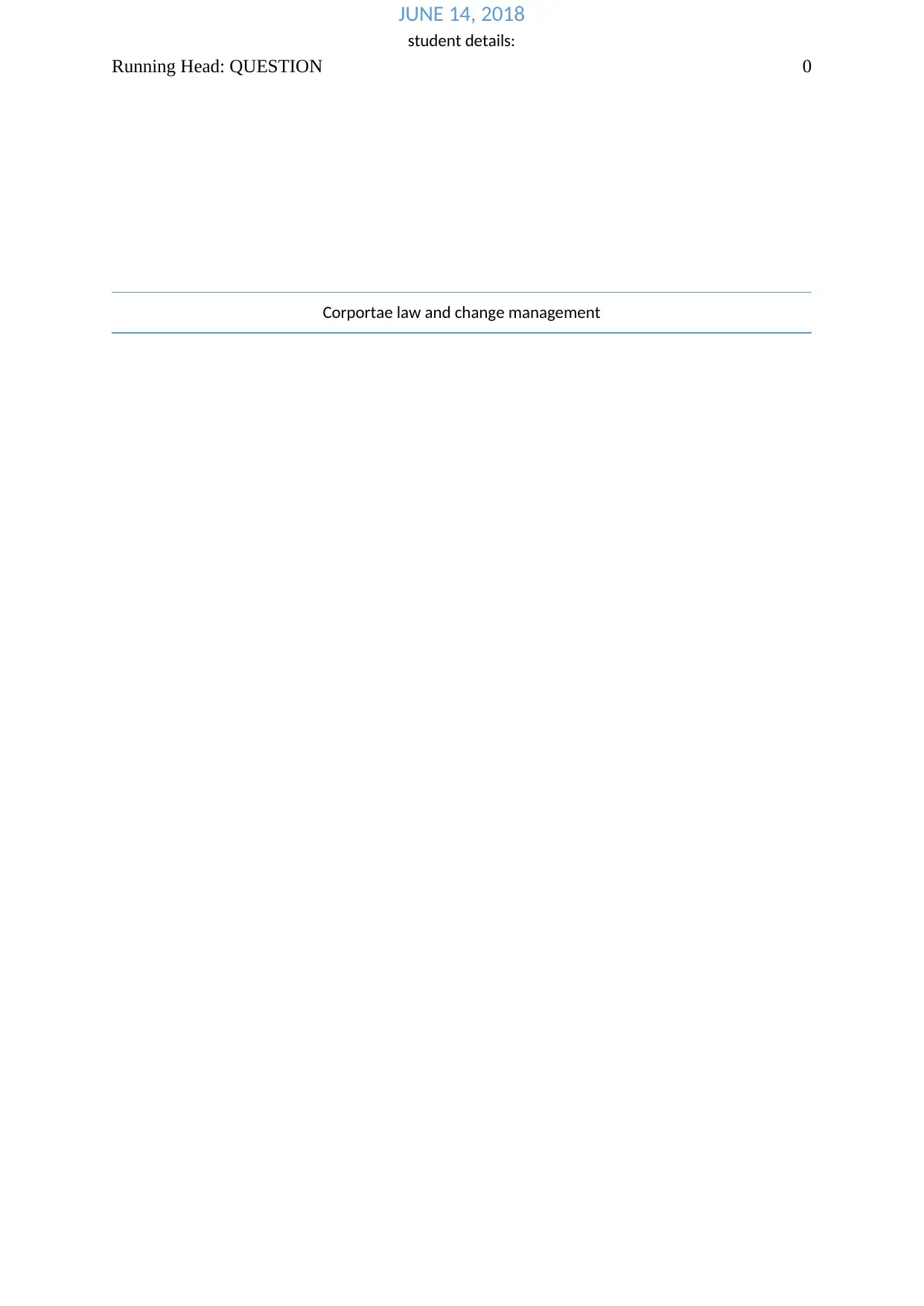
Running Head: QUESTION 0
Corportae law and change management
JUNE 14, 2018
student details:
Corportae law and change management
JUNE 14, 2018
student details:
Paraphrase This Document
Need a fresh take? Get an instant paraphrase of this document with our AI Paraphraser
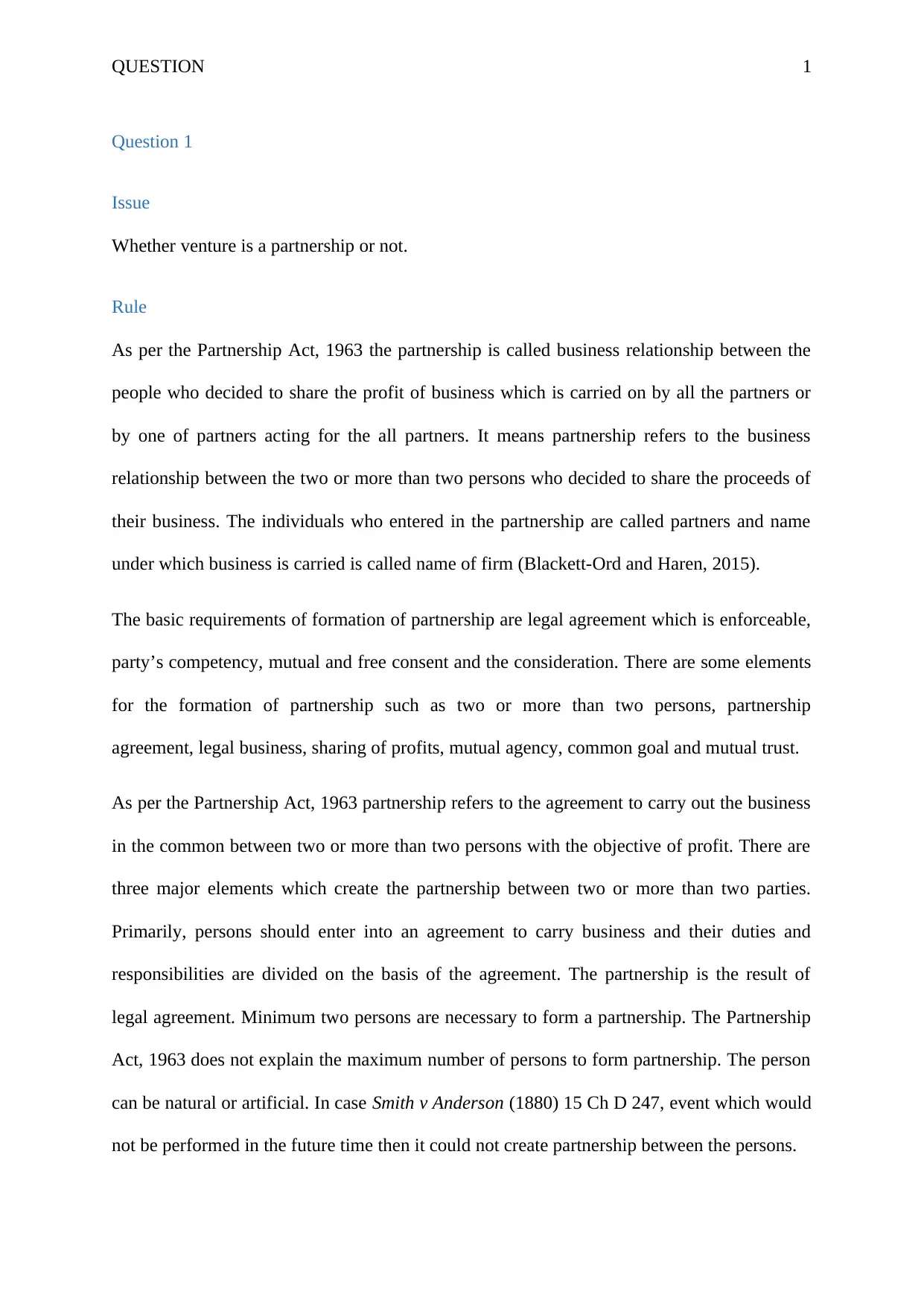
QUESTION 1
Question 1
Issue
Whether venture is a partnership or not.
Rule
As per the Partnership Act, 1963 the partnership is called business relationship between the
people who decided to share the profit of business which is carried on by all the partners or
by one of partners acting for the all partners. It means partnership refers to the business
relationship between the two or more than two persons who decided to share the proceeds of
their business. The individuals who entered in the partnership are called partners and name
under which business is carried is called name of firm (Blackett-Ord and Haren, 2015).
The basic requirements of formation of partnership are legal agreement which is enforceable,
party’s competency, mutual and free consent and the consideration. There are some elements
for the formation of partnership such as two or more than two persons, partnership
agreement, legal business, sharing of profits, mutual agency, common goal and mutual trust.
As per the Partnership Act, 1963 partnership refers to the agreement to carry out the business
in the common between two or more than two persons with the objective of profit. There are
three major elements which create the partnership between two or more than two parties.
Primarily, persons should enter into an agreement to carry business and their duties and
responsibilities are divided on the basis of the agreement. The partnership is the result of
legal agreement. Minimum two persons are necessary to form a partnership. The Partnership
Act, 1963 does not explain the maximum number of persons to form partnership. The person
can be natural or artificial. In case Smith v Anderson (1880) 15 Ch D 247, event which would
not be performed in the future time then it could not create partnership between the persons.
Question 1
Issue
Whether venture is a partnership or not.
Rule
As per the Partnership Act, 1963 the partnership is called business relationship between the
people who decided to share the profit of business which is carried on by all the partners or
by one of partners acting for the all partners. It means partnership refers to the business
relationship between the two or more than two persons who decided to share the proceeds of
their business. The individuals who entered in the partnership are called partners and name
under which business is carried is called name of firm (Blackett-Ord and Haren, 2015).
The basic requirements of formation of partnership are legal agreement which is enforceable,
party’s competency, mutual and free consent and the consideration. There are some elements
for the formation of partnership such as two or more than two persons, partnership
agreement, legal business, sharing of profits, mutual agency, common goal and mutual trust.
As per the Partnership Act, 1963 partnership refers to the agreement to carry out the business
in the common between two or more than two persons with the objective of profit. There are
three major elements which create the partnership between two or more than two parties.
Primarily, persons should enter into an agreement to carry business and their duties and
responsibilities are divided on the basis of the agreement. The partnership is the result of
legal agreement. Minimum two persons are necessary to form a partnership. The Partnership
Act, 1963 does not explain the maximum number of persons to form partnership. The person
can be natural or artificial. In case Smith v Anderson (1880) 15 Ch D 247, event which would
not be performed in the future time then it could not create partnership between the persons.
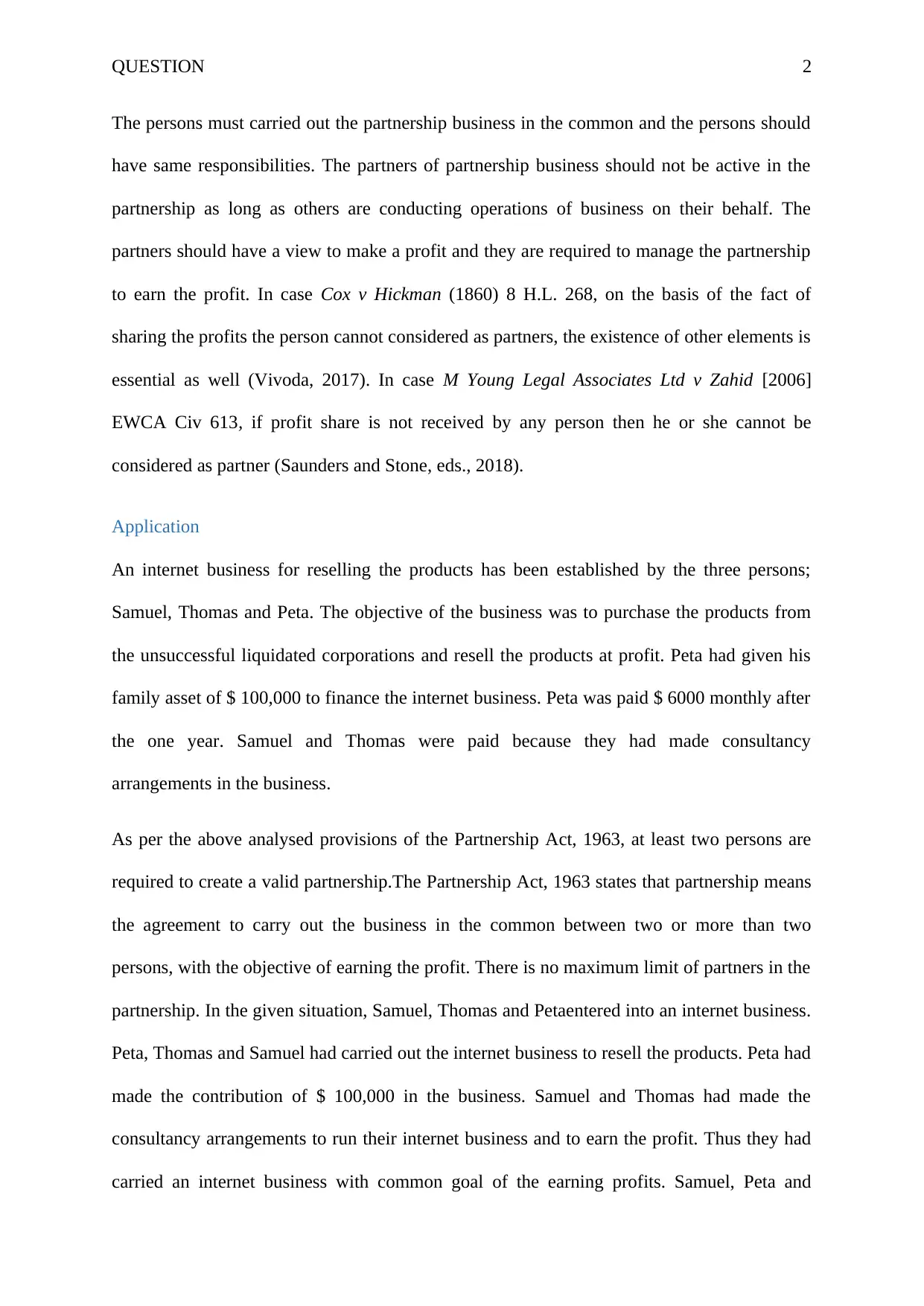
QUESTION 2
The persons must carried out the partnership business in the common and the persons should
have same responsibilities. The partners of partnership business should not be active in the
partnership as long as others are conducting operations of business on their behalf. The
partners should have a view to make a profit and they are required to manage the partnership
to earn the profit. In case Cox v Hickman (1860) 8 H.L. 268, on the basis of the fact of
sharing the profits the person cannot considered as partners, the existence of other elements is
essential as well (Vivoda, 2017). In case M Young Legal Associates Ltd v Zahid [2006]
EWCA Civ 613, if profit share is not received by any person then he or she cannot be
considered as partner (Saunders and Stone, eds., 2018).
Application
An internet business for reselling the products has been established by the three persons;
Samuel, Thomas and Peta. The objective of the business was to purchase the products from
the unsuccessful liquidated corporations and resell the products at profit. Peta had given his
family asset of $ 100,000 to finance the internet business. Peta was paid $ 6000 monthly after
the one year. Samuel and Thomas were paid because they had made consultancy
arrangements in the business.
As per the above analysed provisions of the Partnership Act, 1963, at least two persons are
required to create a valid partnership.The Partnership Act, 1963 states that partnership means
the agreement to carry out the business in the common between two or more than two
persons, with the objective of earning the profit. There is no maximum limit of partners in the
partnership. In the given situation, Samuel, Thomas and Petaentered into an internet business.
Peta, Thomas and Samuel had carried out the internet business to resell the products. Peta had
made the contribution of $ 100,000 in the business. Samuel and Thomas had made the
consultancy arrangements to run their internet business and to earn the profit. Thus they had
carried an internet business with common goal of the earning profits. Samuel, Peta and
The persons must carried out the partnership business in the common and the persons should
have same responsibilities. The partners of partnership business should not be active in the
partnership as long as others are conducting operations of business on their behalf. The
partners should have a view to make a profit and they are required to manage the partnership
to earn the profit. In case Cox v Hickman (1860) 8 H.L. 268, on the basis of the fact of
sharing the profits the person cannot considered as partners, the existence of other elements is
essential as well (Vivoda, 2017). In case M Young Legal Associates Ltd v Zahid [2006]
EWCA Civ 613, if profit share is not received by any person then he or she cannot be
considered as partner (Saunders and Stone, eds., 2018).
Application
An internet business for reselling the products has been established by the three persons;
Samuel, Thomas and Peta. The objective of the business was to purchase the products from
the unsuccessful liquidated corporations and resell the products at profit. Peta had given his
family asset of $ 100,000 to finance the internet business. Peta was paid $ 6000 monthly after
the one year. Samuel and Thomas were paid because they had made consultancy
arrangements in the business.
As per the above analysed provisions of the Partnership Act, 1963, at least two persons are
required to create a valid partnership.The Partnership Act, 1963 states that partnership means
the agreement to carry out the business in the common between two or more than two
persons, with the objective of earning the profit. There is no maximum limit of partners in the
partnership. In the given situation, Samuel, Thomas and Petaentered into an internet business.
Peta, Thomas and Samuel had carried out the internet business to resell the products. Peta had
made the contribution of $ 100,000 in the business. Samuel and Thomas had made the
consultancy arrangements to run their internet business and to earn the profit. Thus they had
carried an internet business with common goal of the earning profits. Samuel, Peta and
⊘ This is a preview!⊘
Do you want full access?
Subscribe today to unlock all pages.

Trusted by 1+ million students worldwide
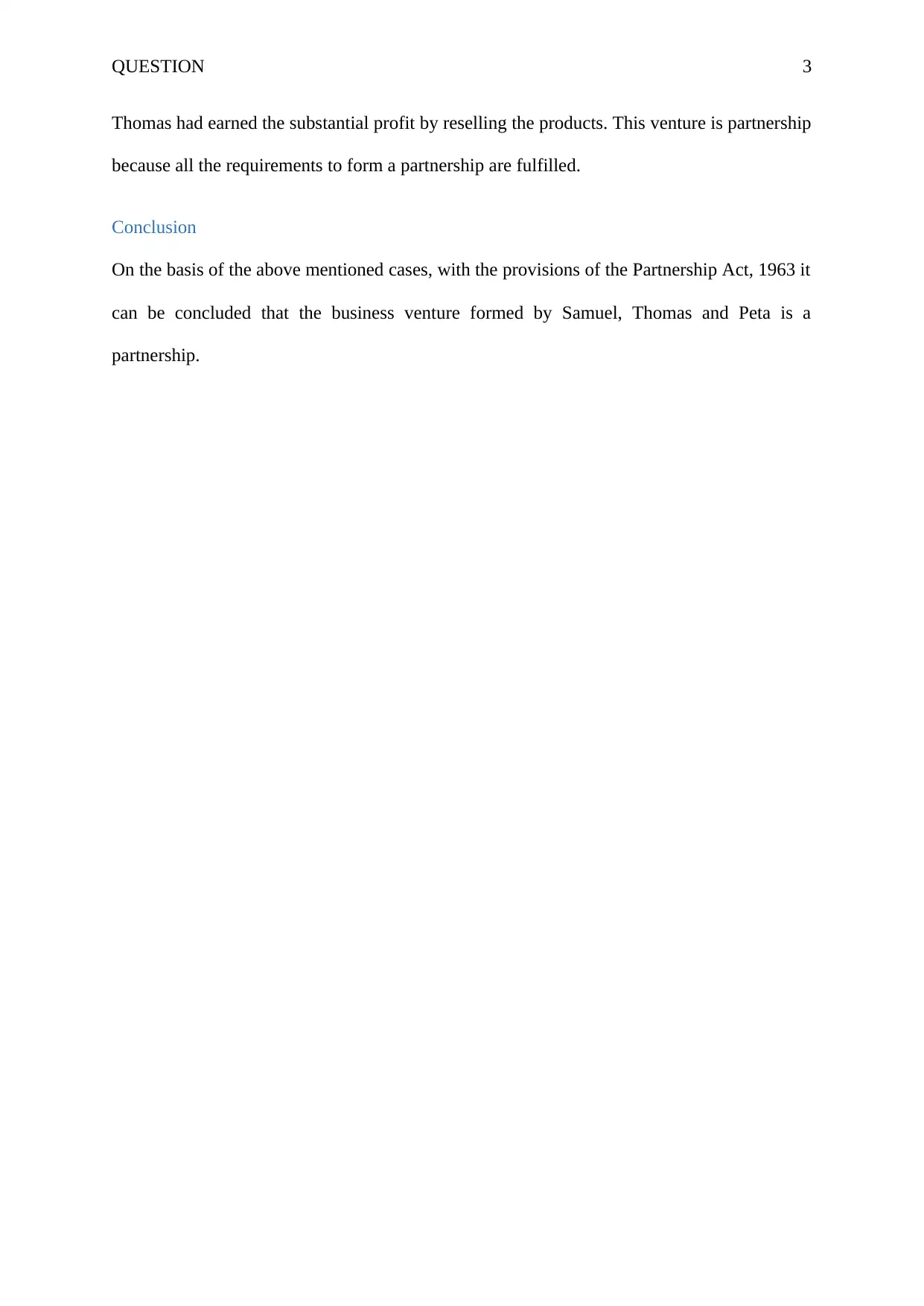
QUESTION 3
Thomas had earned the substantial profit by reselling the products. This venture is partnership
because all the requirements to form a partnership are fulfilled.
Conclusion
On the basis of the above mentioned cases, with the provisions of the Partnership Act, 1963 it
can be concluded that the business venture formed by Samuel, Thomas and Peta is a
partnership.
Thomas had earned the substantial profit by reselling the products. This venture is partnership
because all the requirements to form a partnership are fulfilled.
Conclusion
On the basis of the above mentioned cases, with the provisions of the Partnership Act, 1963 it
can be concluded that the business venture formed by Samuel, Thomas and Peta is a
partnership.
Paraphrase This Document
Need a fresh take? Get an instant paraphrase of this document with our AI Paraphraser
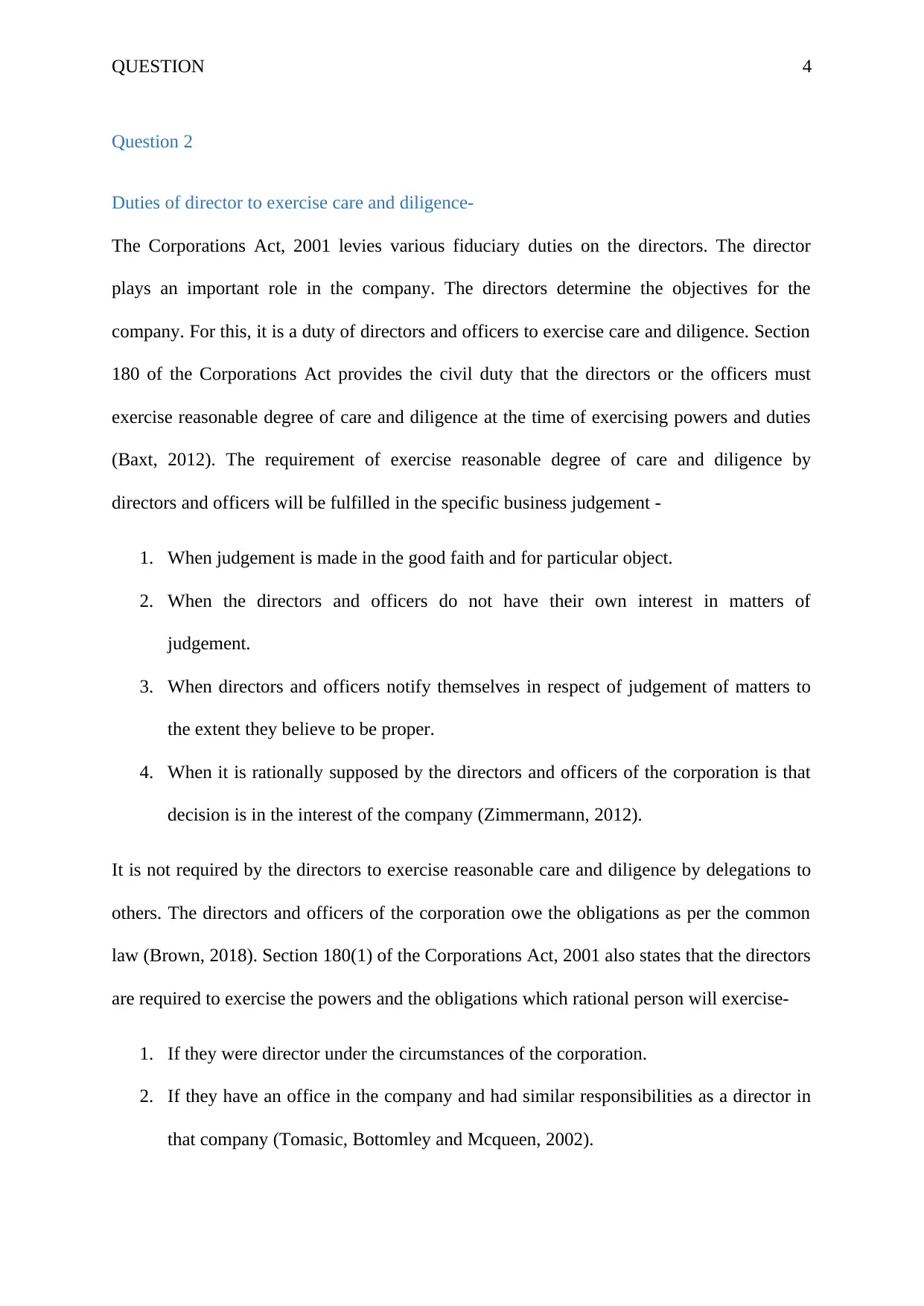
QUESTION 4
Question 2
Duties of director to exercise care and diligence-
The Corporations Act, 2001 levies various fiduciary duties on the directors. The director
plays an important role in the company. The directors determine the objectives for the
company. For this, it is a duty of directors and officers to exercise care and diligence. Section
180 of the Corporations Act provides the civil duty that the directors or the officers must
exercise reasonable degree of care and diligence at the time of exercising powers and duties
(Baxt, 2012). The requirement of exercise reasonable degree of care and diligence by
directors and officers will be fulfilled in the specific business judgement -
1. When judgement is made in the good faith and for particular object.
2. When the directors and officers do not have their own interest in matters of
judgement.
3. When directors and officers notify themselves in respect of judgement of matters to
the extent they believe to be proper.
4. When it is rationally supposed by the directors and officers of the corporation is that
decision is in the interest of the company (Zimmermann, 2012).
It is not required by the directors to exercise reasonable care and diligence by delegations to
others. The directors and officers of the corporation owe the obligations as per the common
law (Brown, 2018). Section 180(1) of the Corporations Act, 2001 also states that the directors
are required to exercise the powers and the obligations which rational person will exercise-
1. If they were director under the circumstances of the corporation.
2. If they have an office in the company and had similar responsibilities as a director in
that company (Tomasic, Bottomley and Mcqueen, 2002).
Question 2
Duties of director to exercise care and diligence-
The Corporations Act, 2001 levies various fiduciary duties on the directors. The director
plays an important role in the company. The directors determine the objectives for the
company. For this, it is a duty of directors and officers to exercise care and diligence. Section
180 of the Corporations Act provides the civil duty that the directors or the officers must
exercise reasonable degree of care and diligence at the time of exercising powers and duties
(Baxt, 2012). The requirement of exercise reasonable degree of care and diligence by
directors and officers will be fulfilled in the specific business judgement -
1. When judgement is made in the good faith and for particular object.
2. When the directors and officers do not have their own interest in matters of
judgement.
3. When directors and officers notify themselves in respect of judgement of matters to
the extent they believe to be proper.
4. When it is rationally supposed by the directors and officers of the corporation is that
decision is in the interest of the company (Zimmermann, 2012).
It is not required by the directors to exercise reasonable care and diligence by delegations to
others. The directors and officers of the corporation owe the obligations as per the common
law (Brown, 2018). Section 180(1) of the Corporations Act, 2001 also states that the directors
are required to exercise the powers and the obligations which rational person will exercise-
1. If they were director under the circumstances of the corporation.
2. If they have an office in the company and had similar responsibilities as a director in
that company (Tomasic, Bottomley and Mcqueen, 2002).
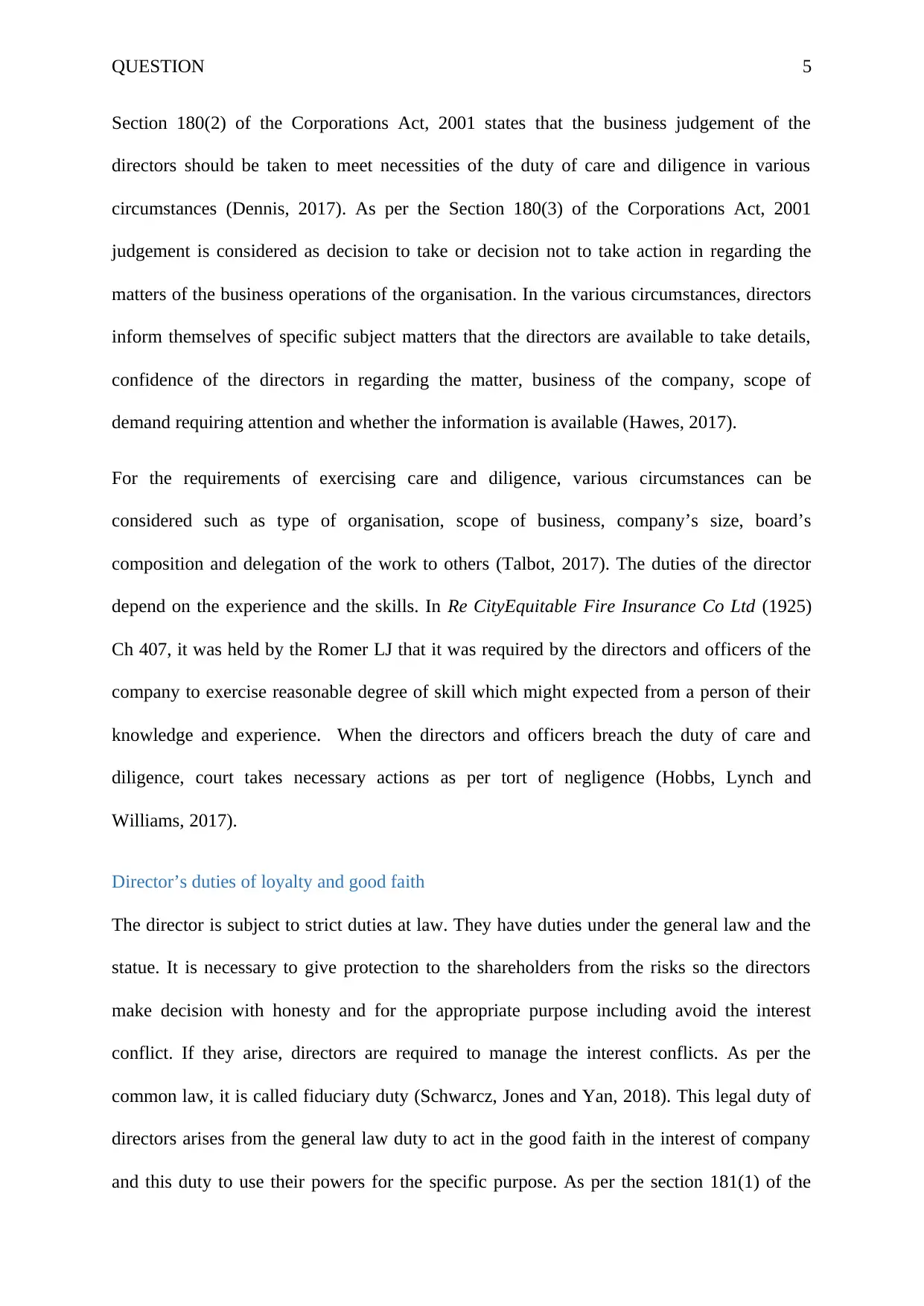
QUESTION 5
Section 180(2) of the Corporations Act, 2001 states that the business judgement of the
directors should be taken to meet necessities of the duty of care and diligence in various
circumstances (Dennis, 2017). As per the Section 180(3) of the Corporations Act, 2001
judgement is considered as decision to take or decision not to take action in regarding the
matters of the business operations of the organisation. In the various circumstances, directors
inform themselves of specific subject matters that the directors are available to take details,
confidence of the directors in regarding the matter, business of the company, scope of
demand requiring attention and whether the information is available (Hawes, 2017).
For the requirements of exercising care and diligence, various circumstances can be
considered such as type of organisation, scope of business, company’s size, board’s
composition and delegation of the work to others (Talbot, 2017). The duties of the director
depend on the experience and the skills. In Re CityEquitable Fire Insurance Co Ltd (1925)
Ch 407, it was held by the Romer LJ that it was required by the directors and officers of the
company to exercise reasonable degree of skill which might expected from a person of their
knowledge and experience. When the directors and officers breach the duty of care and
diligence, court takes necessary actions as per tort of negligence (Hobbs, Lynch and
Williams, 2017).
Director’s duties of loyalty and good faith
The director is subject to strict duties at law. They have duties under the general law and the
statue. It is necessary to give protection to the shareholders from the risks so the directors
make decision with honesty and for the appropriate purpose including avoid the interest
conflict. If they arise, directors are required to manage the interest conflicts. As per the
common law, it is called fiduciary duty (Schwarcz, Jones and Yan, 2018). This legal duty of
directors arises from the general law duty to act in the good faith in the interest of company
and this duty to use their powers for the specific purpose. As per the section 181(1) of the
Section 180(2) of the Corporations Act, 2001 states that the business judgement of the
directors should be taken to meet necessities of the duty of care and diligence in various
circumstances (Dennis, 2017). As per the Section 180(3) of the Corporations Act, 2001
judgement is considered as decision to take or decision not to take action in regarding the
matters of the business operations of the organisation. In the various circumstances, directors
inform themselves of specific subject matters that the directors are available to take details,
confidence of the directors in regarding the matter, business of the company, scope of
demand requiring attention and whether the information is available (Hawes, 2017).
For the requirements of exercising care and diligence, various circumstances can be
considered such as type of organisation, scope of business, company’s size, board’s
composition and delegation of the work to others (Talbot, 2017). The duties of the director
depend on the experience and the skills. In Re CityEquitable Fire Insurance Co Ltd (1925)
Ch 407, it was held by the Romer LJ that it was required by the directors and officers of the
company to exercise reasonable degree of skill which might expected from a person of their
knowledge and experience. When the directors and officers breach the duty of care and
diligence, court takes necessary actions as per tort of negligence (Hobbs, Lynch and
Williams, 2017).
Director’s duties of loyalty and good faith
The director is subject to strict duties at law. They have duties under the general law and the
statue. It is necessary to give protection to the shareholders from the risks so the directors
make decision with honesty and for the appropriate purpose including avoid the interest
conflict. If they arise, directors are required to manage the interest conflicts. As per the
common law, it is called fiduciary duty (Schwarcz, Jones and Yan, 2018). This legal duty of
directors arises from the general law duty to act in the good faith in the interest of company
and this duty to use their powers for the specific purpose. As per the section 181(1) of the
⊘ This is a preview!⊘
Do you want full access?
Subscribe today to unlock all pages.

Trusted by 1+ million students worldwide
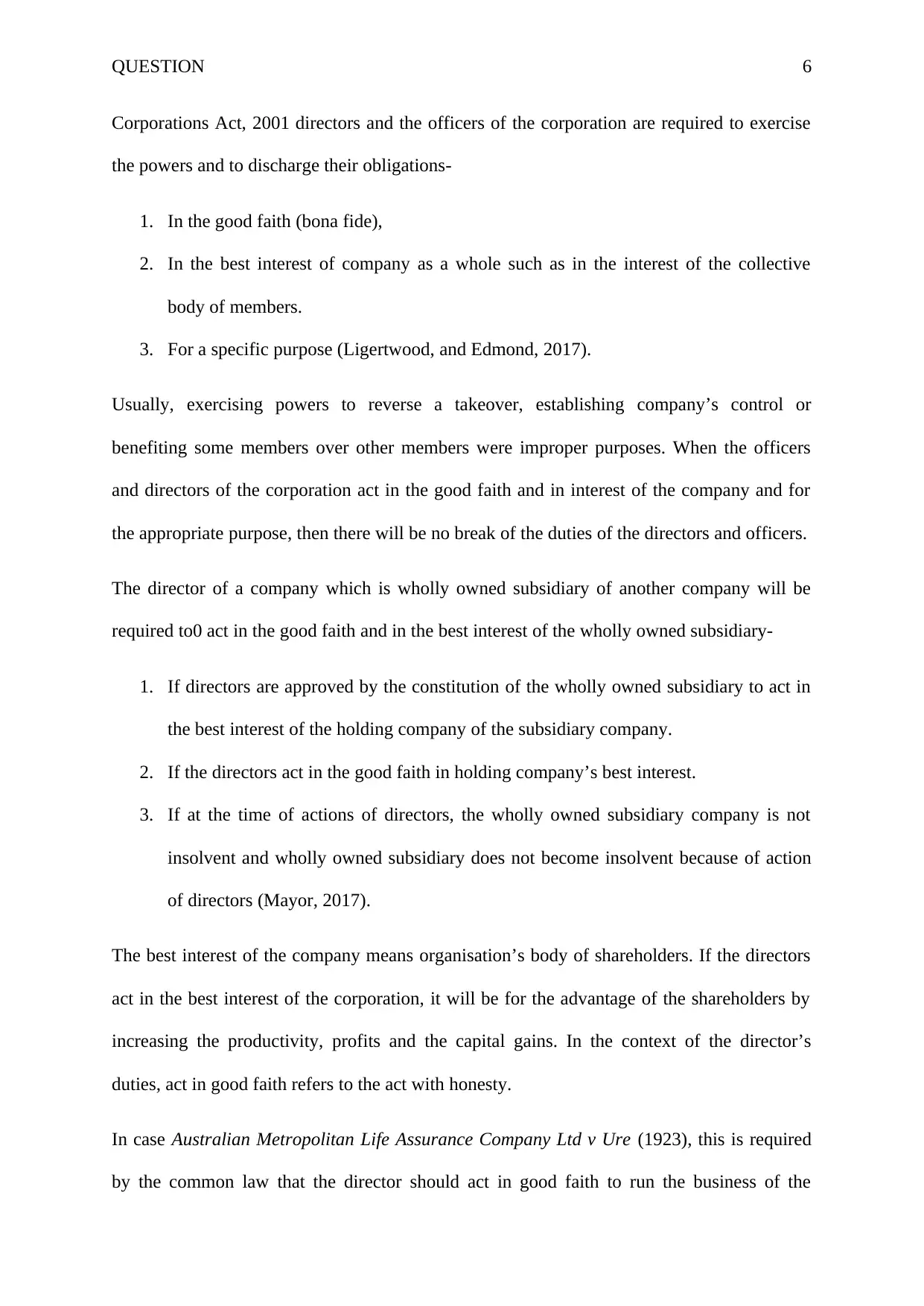
QUESTION 6
Corporations Act, 2001 directors and the officers of the corporation are required to exercise
the powers and to discharge their obligations-
1. In the good faith (bona fide),
2. In the best interest of company as a whole such as in the interest of the collective
body of members.
3. For a specific purpose (Ligertwood, and Edmond, 2017).
Usually, exercising powers to reverse a takeover, establishing company’s control or
benefiting some members over other members were improper purposes. When the officers
and directors of the corporation act in the good faith and in interest of the company and for
the appropriate purpose, then there will be no break of the duties of the directors and officers.
The director of a company which is wholly owned subsidiary of another company will be
required to0 act in the good faith and in the best interest of the wholly owned subsidiary-
1. If directors are approved by the constitution of the wholly owned subsidiary to act in
the best interest of the holding company of the subsidiary company.
2. If the directors act in the good faith in holding company’s best interest.
3. If at the time of actions of directors, the wholly owned subsidiary company is not
insolvent and wholly owned subsidiary does not become insolvent because of action
of directors (Mayor, 2017).
The best interest of the company means organisation’s body of shareholders. If the directors
act in the best interest of the corporation, it will be for the advantage of the shareholders by
increasing the productivity, profits and the capital gains. In the context of the director’s
duties, act in good faith refers to the act with honesty.
In case Australian Metropolitan Life Assurance Company Ltd v Ure (1923), this is required
by the common law that the director should act in good faith to run the business of the
Corporations Act, 2001 directors and the officers of the corporation are required to exercise
the powers and to discharge their obligations-
1. In the good faith (bona fide),
2. In the best interest of company as a whole such as in the interest of the collective
body of members.
3. For a specific purpose (Ligertwood, and Edmond, 2017).
Usually, exercising powers to reverse a takeover, establishing company’s control or
benefiting some members over other members were improper purposes. When the officers
and directors of the corporation act in the good faith and in interest of the company and for
the appropriate purpose, then there will be no break of the duties of the directors and officers.
The director of a company which is wholly owned subsidiary of another company will be
required to0 act in the good faith and in the best interest of the wholly owned subsidiary-
1. If directors are approved by the constitution of the wholly owned subsidiary to act in
the best interest of the holding company of the subsidiary company.
2. If the directors act in the good faith in holding company’s best interest.
3. If at the time of actions of directors, the wholly owned subsidiary company is not
insolvent and wholly owned subsidiary does not become insolvent because of action
of directors (Mayor, 2017).
The best interest of the company means organisation’s body of shareholders. If the directors
act in the best interest of the corporation, it will be for the advantage of the shareholders by
increasing the productivity, profits and the capital gains. In the context of the director’s
duties, act in good faith refers to the act with honesty.
In case Australian Metropolitan Life Assurance Company Ltd v Ure (1923), this is required
by the common law that the director should act in good faith to run the business of the
Paraphrase This Document
Need a fresh take? Get an instant paraphrase of this document with our AI Paraphraser
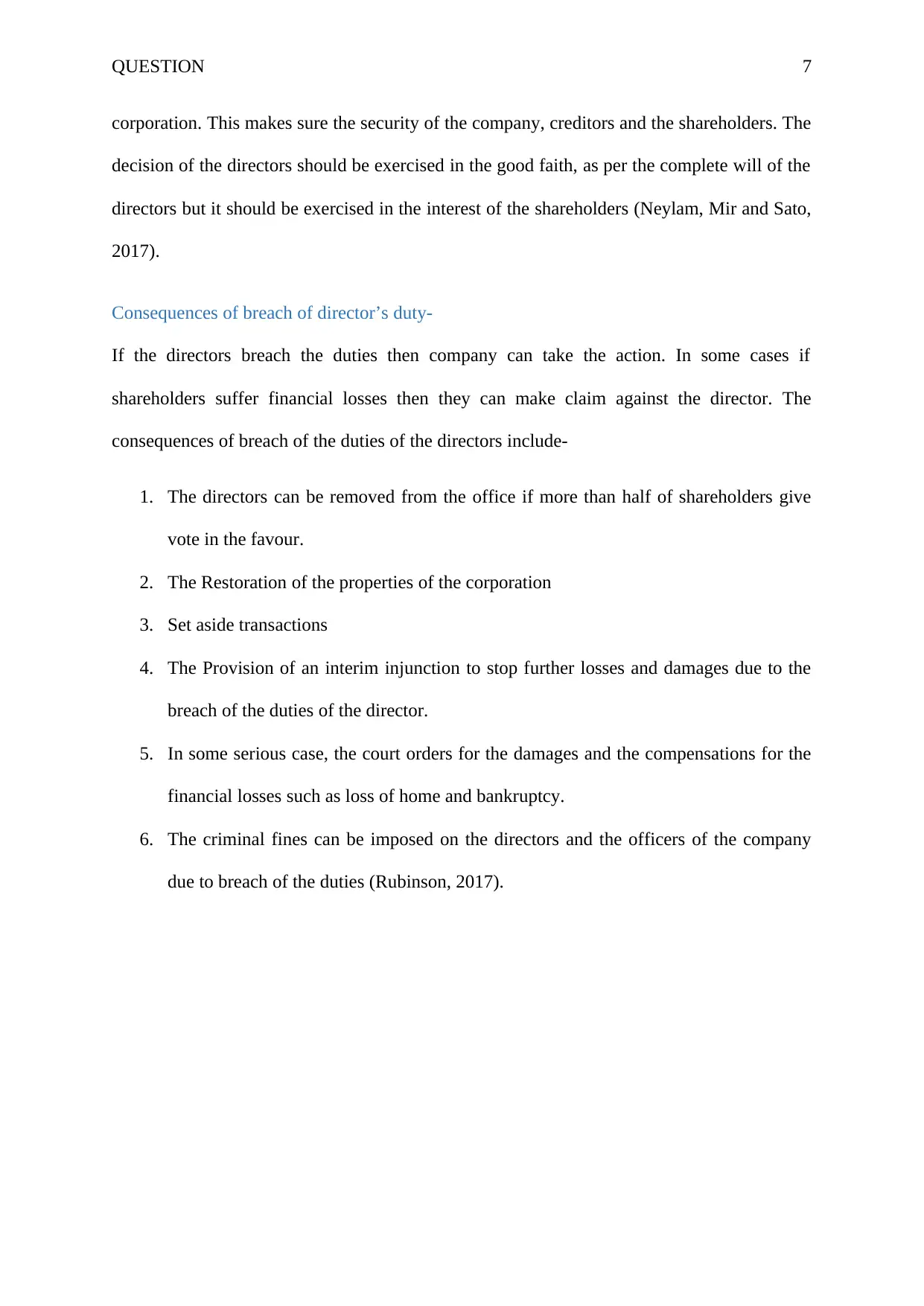
QUESTION 7
corporation. This makes sure the security of the company, creditors and the shareholders. The
decision of the directors should be exercised in the good faith, as per the complete will of the
directors but it should be exercised in the interest of the shareholders (Neylam, Mir and Sato,
2017).
Consequences of breach of director’s duty-
If the directors breach the duties then company can take the action. In some cases if
shareholders suffer financial losses then they can make claim against the director. The
consequences of breach of the duties of the directors include-
1. The directors can be removed from the office if more than half of shareholders give
vote in the favour.
2. The Restoration of the properties of the corporation
3. Set aside transactions
4. The Provision of an interim injunction to stop further losses and damages due to the
breach of the duties of the director.
5. In some serious case, the court orders for the damages and the compensations for the
financial losses such as loss of home and bankruptcy.
6. The criminal fines can be imposed on the directors and the officers of the company
due to breach of the duties (Rubinson, 2017).
corporation. This makes sure the security of the company, creditors and the shareholders. The
decision of the directors should be exercised in the good faith, as per the complete will of the
directors but it should be exercised in the interest of the shareholders (Neylam, Mir and Sato,
2017).
Consequences of breach of director’s duty-
If the directors breach the duties then company can take the action. In some cases if
shareholders suffer financial losses then they can make claim against the director. The
consequences of breach of the duties of the directors include-
1. The directors can be removed from the office if more than half of shareholders give
vote in the favour.
2. The Restoration of the properties of the corporation
3. Set aside transactions
4. The Provision of an interim injunction to stop further losses and damages due to the
breach of the duties of the director.
5. In some serious case, the court orders for the damages and the compensations for the
financial losses such as loss of home and bankruptcy.
6. The criminal fines can be imposed on the directors and the officers of the company
due to breach of the duties (Rubinson, 2017).
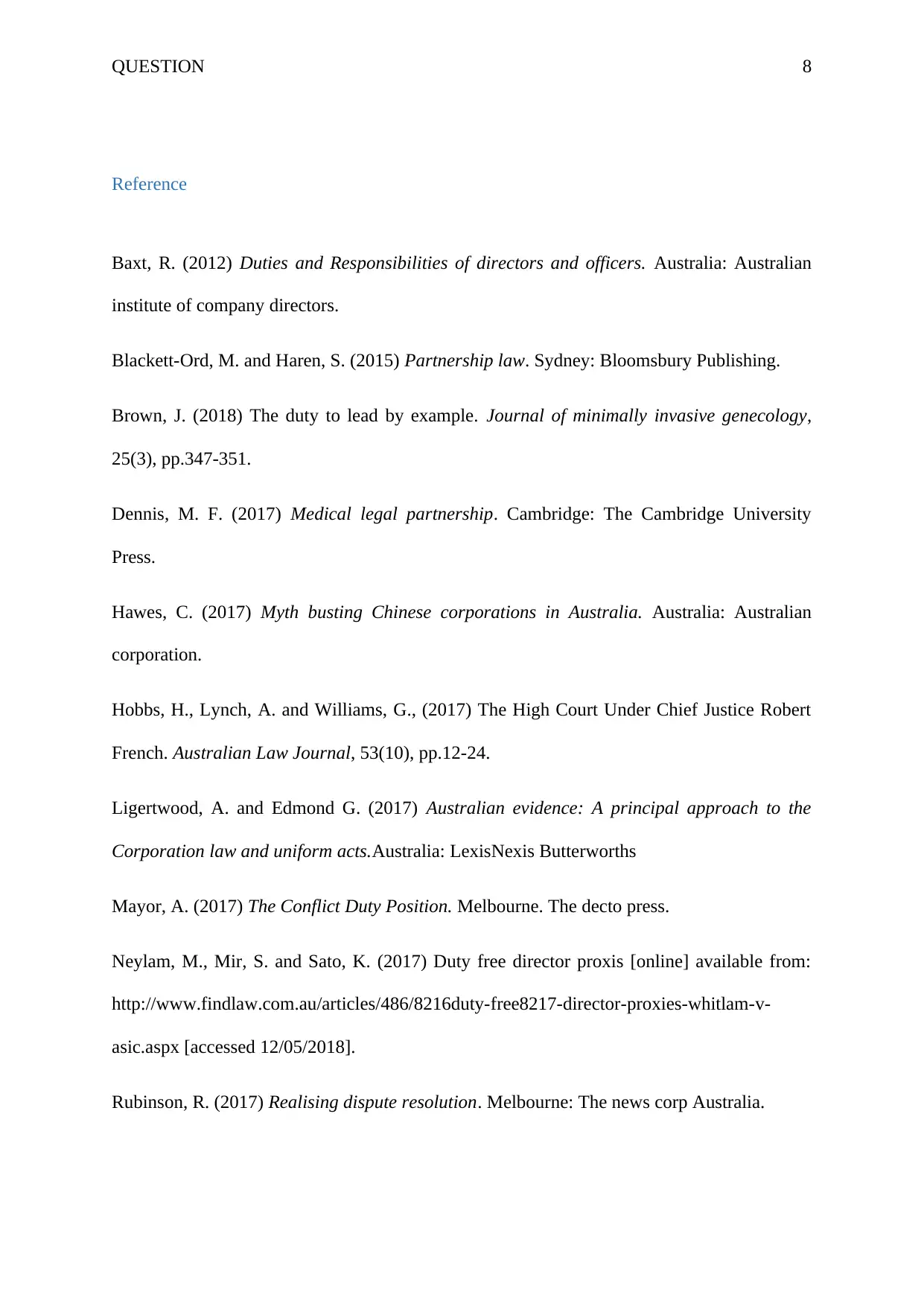
QUESTION 8
Reference
Baxt, R. (2012) Duties and Responsibilities of directors and officers. Australia: Australian
institute of company directors.
Blackett-Ord, M. and Haren, S. (2015) Partnership law. Sydney: Bloomsbury Publishing.
Brown, J. (2018) The duty to lead by example. Journal of minimally invasive genecology,
25(3), pp.347-351.
Dennis, M. F. (2017) Medical legal partnership. Cambridge: The Cambridge University
Press.
Hawes, C. (2017) Myth busting Chinese corporations in Australia. Australia: Australian
corporation.
Hobbs, H., Lynch, A. and Williams, G., (2017) The High Court Under Chief Justice Robert
French. Australian Law Journal, 53(10), pp.12-24.
Ligertwood, A. and Edmond G. (2017) Australian evidence: A principal approach to the
Corporation law and uniform acts.Australia: LexisNexis Butterworths
Mayor, A. (2017) The Conflict Duty Position. Melbourne. The decto press.
Neylam, M., Mir, S. and Sato, K. (2017) Duty free director proxis [online] available from:
http://www.findlaw.com.au/articles/486/8216duty-free8217-director-proxies-whitlam-v-
asic.aspx [accessed 12/05/2018].
Rubinson, R. (2017) Realising dispute resolution. Melbourne: The news corp Australia.
Reference
Baxt, R. (2012) Duties and Responsibilities of directors and officers. Australia: Australian
institute of company directors.
Blackett-Ord, M. and Haren, S. (2015) Partnership law. Sydney: Bloomsbury Publishing.
Brown, J. (2018) The duty to lead by example. Journal of minimally invasive genecology,
25(3), pp.347-351.
Dennis, M. F. (2017) Medical legal partnership. Cambridge: The Cambridge University
Press.
Hawes, C. (2017) Myth busting Chinese corporations in Australia. Australia: Australian
corporation.
Hobbs, H., Lynch, A. and Williams, G., (2017) The High Court Under Chief Justice Robert
French. Australian Law Journal, 53(10), pp.12-24.
Ligertwood, A. and Edmond G. (2017) Australian evidence: A principal approach to the
Corporation law and uniform acts.Australia: LexisNexis Butterworths
Mayor, A. (2017) The Conflict Duty Position. Melbourne. The decto press.
Neylam, M., Mir, S. and Sato, K. (2017) Duty free director proxis [online] available from:
http://www.findlaw.com.au/articles/486/8216duty-free8217-director-proxies-whitlam-v-
asic.aspx [accessed 12/05/2018].
Rubinson, R. (2017) Realising dispute resolution. Melbourne: The news corp Australia.
⊘ This is a preview!⊘
Do you want full access?
Subscribe today to unlock all pages.

Trusted by 1+ million students worldwide
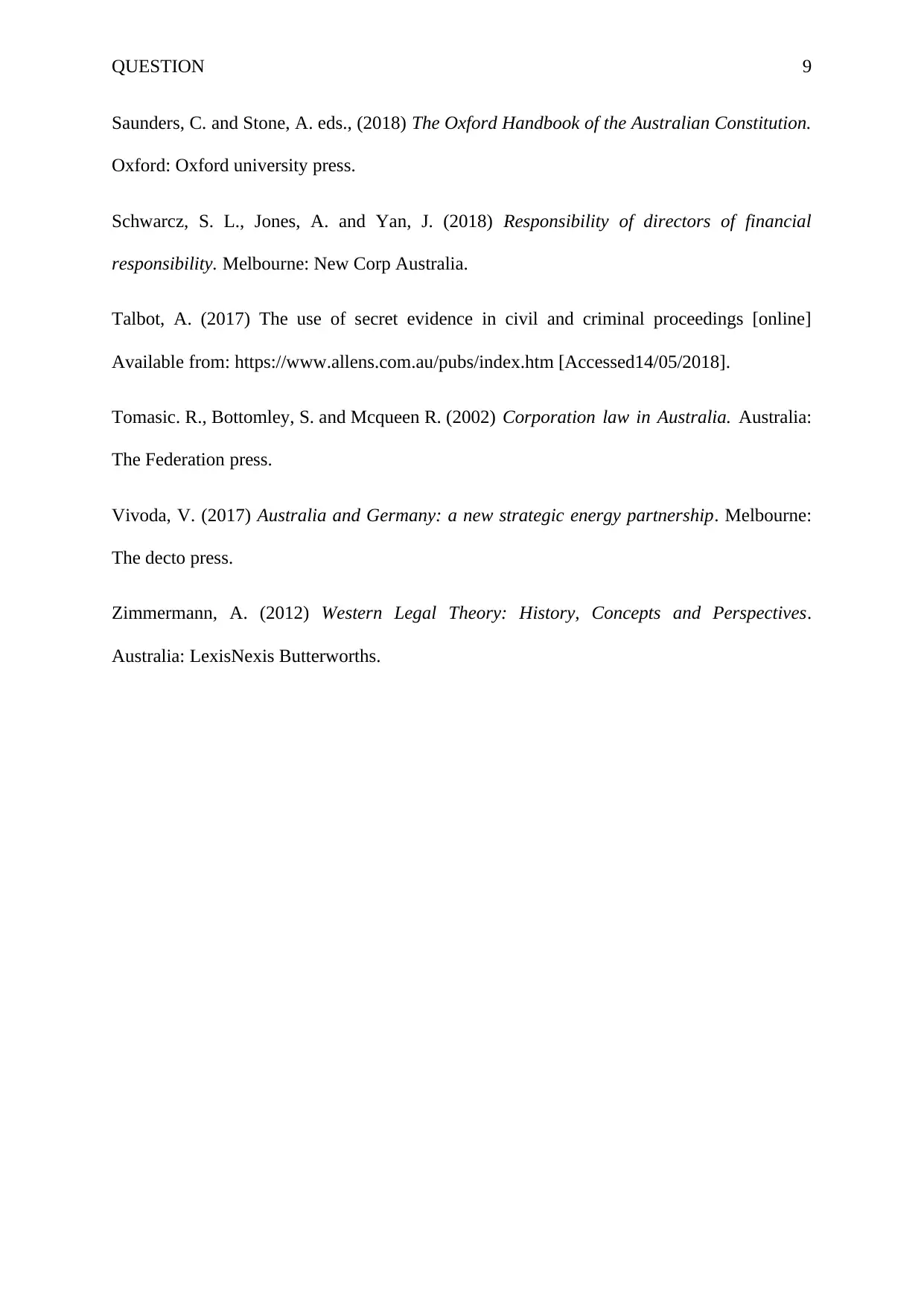
QUESTION 9
Saunders, C. and Stone, A. eds., (2018) The Oxford Handbook of the Australian Constitution.
Oxford: Oxford university press.
Schwarcz, S. L., Jones, A. and Yan, J. (2018) Responsibility of directors of financial
responsibility. Melbourne: New Corp Australia.
Talbot, A. (2017) The use of secret evidence in civil and criminal proceedings [online]
Available from: https://www.allens.com.au/pubs/index.htm [Accessed14/05/2018].
Tomasic. R., Bottomley, S. and Mcqueen R. (2002) Corporation law in Australia. Australia:
The Federation press.
Vivoda, V. (2017) Australia and Germany: a new strategic energy partnership. Melbourne:
The decto press.
Zimmermann, A. (2012) Western Legal Theory: History, Concepts and Perspectives.
Australia: LexisNexis Butterworths.
Saunders, C. and Stone, A. eds., (2018) The Oxford Handbook of the Australian Constitution.
Oxford: Oxford university press.
Schwarcz, S. L., Jones, A. and Yan, J. (2018) Responsibility of directors of financial
responsibility. Melbourne: New Corp Australia.
Talbot, A. (2017) The use of secret evidence in civil and criminal proceedings [online]
Available from: https://www.allens.com.au/pubs/index.htm [Accessed14/05/2018].
Tomasic. R., Bottomley, S. and Mcqueen R. (2002) Corporation law in Australia. Australia:
The Federation press.
Vivoda, V. (2017) Australia and Germany: a new strategic energy partnership. Melbourne:
The decto press.
Zimmermann, A. (2012) Western Legal Theory: History, Concepts and Perspectives.
Australia: LexisNexis Butterworths.
1 out of 10
Related Documents
Your All-in-One AI-Powered Toolkit for Academic Success.
+13062052269
info@desklib.com
Available 24*7 on WhatsApp / Email
![[object Object]](/_next/static/media/star-bottom.7253800d.svg)
Unlock your academic potential
Copyright © 2020–2026 A2Z Services. All Rights Reserved. Developed and managed by ZUCOL.





